Not seeing the wood for the trees – the cultural impact of increasing tree cover in Wales

Jon Gower talks to Hefin Jones
When cattle farmer Hefin Jones concluded his degree in Welsh and history at Swansea University in the early 2000s, little did he imagine that one of the powerful poems he was studying would find a dark new resonance two decades later.
‘Rhydcymerau’ by D. Gwenallt Jones (1951) describes changes in North Carmarthenshire during the first half of the 20th century at the hands of the UK Government, when huge blanket plantings of trees such as sitka spruce were encouraged.
The poem, according to The Cambridge History of Welsh Literature ‘provides a new and apocalyptically political context to the post-war innovation of the planned rural economy:
Plannwyd egin coed y Trydydd Rhyfel
Ar dir Esgeir-ceir a meysydd Tir-bach
Ger Rhydcymerau.
(The saplings of the third war have been planted
On the lands of Esgeir-ceir and the fields of Tir-bach
Near Rhydcymerau.)
It’s a poem vividly populated with the poet’s ancestors, the grandmother with a face like medieval parchment and whose spoken Welsh was a time capsule and his grandfather and uncle who were farmers, poets and chapel deacons.
These have all gone, only to be replaced by lifeless stretches of monoculture pine – ‘Coed lle bu cymdogaeth,/ Fforest lle bu ffermydd’ – while the poem concludes with the starkest of images, the trees standing like columns in the landscape where:
‘…as if on crosses
The skeletons of poets, deacons, ministers and
Sunday School teachers
Bleaching in the sun
And being washed by the rain and dried by the sun.
The poem refers to what Hefin Jones describes as a ‘Government-orchestrated environmental and social catastrophe, the compulsory purchase and clearing of hill farms, and clearance of the inhabitants for the commercial growing of conifers for wood production. It resulted in the creation of plantations such as Brechfa forest – just under 10 miles away from our farm.
‘Since there had been such a demand for timber, the Westminster Government decided there should be a sufficiently large area of forest established to ensure that there would not be a shortage in future.’
In an article he recently wrote for the Farmers Guardian Jones, who is NFU Cymru Carmarthenshire’s vice-chair, found a ready if regrettable comparison between then and now, as history seems to be repeating itself: ‘Fast forward to 2021 and glance at the written statement on Trees and Timber by Lee Waters, Welsh Government’s Deputy Minister for Climate Change, and you’ll find similar arguments based on the demand for timber to supply sustainable construction and carbon sequestration.
‘The target is to plant 180,075ha (444,789 acres) in Wales by 2050. Five years ago, there were 306,130 ha (756,142 acres) of woodland in Wales. Since this is below the European average, many might argue the target is a realistic one, particularly given the climate change combating credentials of trees.
‘However, we see Welsh Government fall at the hurdles of nuance, detail and consideration of intended and unintended consequences in policy planning.’
Long lasting trauma
Outside investors have been quick to buy up land, prompting leader writers such as Will Evans to opine in Farmers Weekly that replacing farms with forests would cause ‘long-lasting trauma’ that would ‘echo down the years…And this is what’s at stake. If the Welsh Government doesn’t urgently do something to stop these corporates and the land grabs that are already well under way, large areas of our country will be changed irreversibly, and people here will once again be removed from their land, never to return.’
Hefin Jones echoes that sentiment. ‘Some of these groups aren’t working in the spirit of what Welsh Government wants to achieve. Often it’s a case of companies buying carbon credits instead of reducing their own CO2 emissions. They might buy a plot of land in Wales and carry on business as usual.
‘It’s quite perverse and it strikes me that Welsh Government haven’t seen through that and because they’re in pursuit of an arbitrary target they’re willing to sacrifice the livelihoods of many farmers and the well-being and sustainability of communities so that they can put a tick in the box and stand at some summit or other and say Wales has played its part. At what real cost is the question?’
So do his fellow farmers agree with his often trenchant stand about planting?
‘Yes because we can all see the threat that this sort of operation brings. NFU Cymru has produced the ‘Growing Together’ document, a strategy for sustainably increasing tree cover in Wales that sets out the key considerations, barriers and opportunities if the challenge of meeting tree planting targets is to be achieved alongside the continued production of high quality affordable food and thriving rural communities. ‘
We need trees and hedgerows for the role they play in food production and there is scope for certain types of land – because of the nature of the ground or for reasons of accessibility – to be used for afforestation.
‘But it needs to be done sensitively. It needs to be done alongside food production, it shouldn’t replace food production, given the current situation in the world, especially in Ukraine. It does focus the mind somewhat – what’s the most prudent use of good agricultural land? At no point should we see afforestation displace or replace food production.’

Vexatious
NFU Cymru’s ‘Growing Together’ strategy underlines the need to balance the need to respond to the Welsh Government’s climate emergency whilst safeguarding rural communities, reminding us that the UK Climate Change Committee ‘recognises that the transition to net zero must spread costs across society. With respect to expanding tree cover, it is not reasonable for Welsh Government to establish targets for tree planting or a National Forest without understanding costs to farming and the food and drink sector, that are central to the Welsh economy and our rural communities.’
The stategy calls for mechanisms within the forthcoming Agriculture (Wales) Bill to ensure food security and the establishment of a commission to ensure that the burden of decarbonisation does not fall unequally on rural communities.
For Jones the matter of buying farmable land, often by external investors, for afforestation is extremely vexatious: ‘They say they want to invest in communities but that shouldn’t involve ripping their hearts out. While the schemes they’ve drawn up facilitate the movement of money and a return for undertaking these environmental works, these public goods as they’re seen, the consequences are that say tenant farmers are removed from the land.
‘I’m fearful that as a consequence of creating what is essentially a false market we will see people move out of rural areas, see a brain drain as young people leave the area, as we’ve already seen in Carmarthenshire.
‘Unless that is, Welsh Government recognise their current tree planting schemes are assisting external investors with this land grab and mitigate, by, say, making sure that any proposal to plant a farm is subject to a community impact assessment and subject to a planning process.
‘My personal view is I would want to see such decisions subject to local authority planning system. Then you’d be giving the local community a chance to have an input and as with many contentious major developments because of their very nature it might be called in.
‘Very often people or companies who want to implement large scale or contentious developments have to present their plans to the local community for consultation. Unless done voluntarily, this is not a requirement in the case of large scale afforestation projects.
‘Without such a process, decisions and actions are railroaded and it’s only by protest and by kicking and screaming that people have their voices heard . It seems that Welsh Government aren’t keen on the idea of making planning schemes subject to planning processes. It may point to a disconnect between Welsh Government’s aspirations and the needs, desires and concerns of rural communities.’
Displacement
On my way to visit Hefin I spoke to someone whose mother was thinking of selling a small parcel of land but was going to insist that it should not be planted upon. Hefin admired her principle and resolve but cautioned that ‘Even if you sell to a first party it does not mean that there won’t be another sale in a matter of months. Once you sell your land it’s outside of your control thereafter. It seems like a free for all at the minute – there is a concerning trend of buying up bits of Wales.
‘If you’re a farmer – and many in Wales are elderly and have no succession and no children who want to look after the land themselves – well we all want the best for our families and it takes a particular person not to take the highest price from a bidder. The price of land is often out of the range of locals. We see a displacement of land used for food production by afforestation. It shouldn’t happen.’
It can also lead to a displacement of people, as Jones avers: ‘I’ve been brought up in a Welsh speaking home and community and enjoyed my education and social life through the medium of the language. If you all of a sudden remove people from the land, even if Wales remains an attractive place to live and as a bolthole for many you’re removing one of the bastions of the language.
‘While the language gains in places of population density such as Cardiff the rest of the country suffers. You might end up creating “The Forest of the West of England” with lots of trees and very few people, some who don’t want to live there all of the time. We are looking at a real threat to vibrant communities and if Welsh Government insists on disregarding those concerns we’ll be feeling the effects sooner rather than later regrettably.’
Jones stresses that he isn’t against tree planting per se. ‘On our farm we’ve been involved in the Glastir agri-environment management scheme, both planting and managing woodland. If I took you around the farm there isn’t single field that doesn’t have a mature hedge or mature trees and they’re there for a reason, so I’m not anti-trees, or anti hedgerows.
‘But the worrying things about what the Welsh Government is facilitating at the moment is the scale and pace of change and the likely impact on areas that very often Senedd members in Cardiff don’t have a feel for.
‘They don’t understand the delicate state of some of these countryside communities, they don’t even have the mechanisms in place to monitor it. Many Welsh-speaking communities and the fabric of those communities could be fundamentally damaged as if overnight.’
Trees even feature in the name of the Jones’s farm. ‘Wern means “alder” and that’s a tree that favours wet and marshy conditions. We also have a parcel of land near Gelli Aur called Wern Dolau and “wern” of course features in that name as well. There’s a lot in a name and that’s also a concern. When farms get broken up the names of fields and the names of the farms themselves can be so easily lost.
‘Ours is right next to the National Botanic Garden of Wales and hugs the side of a valley.The top land is drier better land and as you move down to the lower part it’s heavier and wetter in nature and hence the name.’
It’s a farm that’s been though some changes as it passes down the generations: ‘It’s 120 acres and I’m the fourth generation to work it. In the past it was a mixed farm. I can vividly recall conversations with my late father, Vernon Jones, when he told me about the vegetable round they had in parts of the Gwendraeth Valley, how they made butter and when they sold bacon and pork products. The farm’s no stranger to diversification.
‘I have childhood memories, having been brought up here of when it was a dairy farm with some beef cattle as well as well as a straw and hay dealership. Now because I have another business off the farm milking was too much of a commitment – having to be there to milk twice a day – so we opted for a beef enterprise and my diversification is in reverse if you like.’
Survival mode
There are plenty of challenges facing farmers at the moment, not least the soaring cost of feed, fuel and fertilizer yet Hefin Jones feels a particular anxiety about the fashion of buying up of Welsh farmland by faceless corporations from outside of Wales for afforestation.
‘In doing so, they stand to claim many hundreds of thousands of pounds in Welsh Government grant funding. How does this type of carbon offsetting in any way benefit the local economy or community when such large sums of money flow out of the country? It simply turns Wales into a carbon dump.
‘I feel that rural, Welsh speaking communities are being forced into some sort of survival mode by the current direction of travel in Welsh Government policy. We all know that communities that thrive can contribute and achieve a hell of a lot more than those that simply exist to survive. Why won’t the current Welsh Government recognise this?
‘It’s not acceptable for rural communities – and the culture and heritage on those areas – to be collateral damage because of an over simplistic, rushed and ill-conceived policy. There is a growing feeling among farmers that we are currently producing high quality and safe food, whilst caring for the environment, despite our governments, not alongside or in collaboration with them. In this day and age, that is a sad and dangerous state of affairs.
‘It’s all well and good – and right – that the Welsh Government’s Minister for the Economy Vaughan Gething warns about the threat to Welsh agriculture posed by a FTA with Canada. I only wish that he would acknowledge the equal and immediate threat posed by his own government’s actions.’

Standing with Hefin Jones on a ridge of field as the late afternoon sun goldens the Tywi valley in the distance it can look like a perfect idyll. Hills of green undulation. The river a bronze snake meandering through. But then as the saying has it, there’s often trouble in paradise. I’m reminded of how climate change was predicted in Islwyn Ffowc Elis’s prophetic 1957 novel Wythnos yn Nghymru Fydd recently translated for the first time by Stephen Morris as A Week in Future Wales. At one point the question is asked
‘Where do you get your coffee these days…From Brazil, still, I expect?
‘This came from the Tywi Valley,’said Llywarch.
In the Tywi Valley of today the changes wrought by climate change aren’t quite so beneficial, and neither are they necessarily benign. But of change itself there is precious little doubt.
Support our Nation today
For the price of a cup of coffee a month you can help us create an independent, not-for-profit, national news service for the people of Wales, by the people of Wales.






Do these faceless corporations realise that wood burns rather easily? I wonder if any of them (of course they haven’t) read Argoed by T Gwynn Jones?